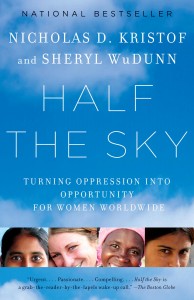
According to a Chinese proverb, women hold up half the sky.
“Half the Sky: Turning Oppression into Opportunity for Women Worldwide”, written by Pulitzer Prize winners Nicholas Kristof and Sheryl WuDunn, argues that women are the greatest untapped resource in the developing world.
It also makes the bold argument the maternal health, domestic violence, sex trafficking, contraception and abortion, education for girls and jobs for women can no longer be dismissed as “women’s issues” to be faced once the real issues are out of the way.
According to Kristoff and WuDunn, this has become a human right’s cause that deserves the same global attention that slavery received in the 1800’s.
And I say, it’s about time.
The conditions of many women in the world today are comparable to the slaves of the 19th century.
In some countries, the laws that tie a woman to her husband are laws of ownership, in which a woman must be punished for disobedience.
While laws can be changed, the attitudes behind them are deeply ingrained in culture.
According to the United Nation’s 2010 World Women’s Report, female participation in the labor force has remained fairly steadily around 52 percent.
This includes women in developed and underdeveloped countries.
Perhaps more alarming, is that for the past two decades women have counted for two-thirds of the world’s illiterate adults.
Yet, “Half the Sky” is more than a monotonous recitation of facts. It tells the stories of women who defied norms and rose above their circumstances.
It contains the last thing one might expect to find in a book about oppression: hope.
There are powerful aid groups that are affecting change by leaps and bounds. These groups are often backed by the wealthy and generous from developed countries.
But it is more encouraging to read about the overlooked and often underfunded grassroots aid groups, sometimes lead by local women who are just tired and angry.
The “wrath of a woman scorned” is more powerful than you might think.
Many of these stories focus on social entrepreneurs, or people who take risks because they see a need in their community.
In a refreshing change, “Half the Sky” does not use the stories of women to create martyrs.
There is no “she was raped by awful men and then she died.”
Instead, the stories are more along the lines of “she was raped and she fought back.”
Reading statistics about education and unemployment rates for women can change the way you see oppression.
But if that is all I wanted to know I could read the UN’s 2010 World’s Women Report, and I did.
However, reading the stories about women who experience sexual trafficking, genital cutting (a practice still considered a rite of passage in Africa) and honor killings and rise above it can change the way you see everything.
“Half the Sky” has been hailed as a wake-up call and a call to arms. It has also been compared to Rachel Carson’s “Silent Spring.”
However, the national attention “Half the Sky” has gained is not nearly as important as the affect it has on each of its readers.
Reading “Half the Sky” may make social entrepreneurs of us all.


